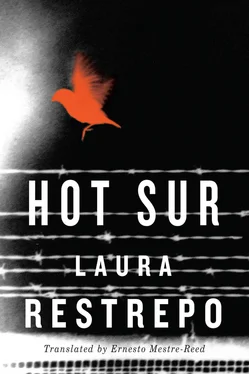The Toyota was in good shape, and the day after the accident with the bear, Ian offered it to Cleve in exchange for the bike. But Cleve wasn’t in the least bit willing to make such a swap. He said he’d prefer to ride out his life on his motorcycle, that’s exactly what he said, and on it he’d ride to his death some time later, not in the Catskills but in the outskirts of Chicago, after losing control, crashing violently against the metal railing, and flying through the air, bike and all. He broke his back in various places from the fall, and rolled more than 130 feet in the ditch bordering the highway, and his body was pummeled by stones and his skin torn by branches before ending up among some bushes. The road had little traffic; there were no witnesses to record what had happened. Because it was considered an accident, only the highway patrol and the paramedics attended to the body. But Ian Rose could not get out of his head that his son’s death had been less an accident and more the fulfillment of some doomed destiny.
“I think it was in the cards,” he tells me. “For me it was something expected, which could have been prevented. You understand. Something that I could have stopped.”
Before the package had arrived, Rose had always tried to ignore Manninpox prison, which hadn’t been easy. Like he told me, you need to do a lot of yoga and take very long walks in the woods to go on with your life when the agony of strangers is just around the corner.
“It’s not the most pleasant thing in the world to have a women’s maximum security prison up the road from where you sleep,” Ian Rose tells me. “If the concept of men locked up is perverse, women caged up is outright monstrous.”
He had bought the house not knowing what was nearby. The real estate agent hadn’t told him anything, perhaps knowing he’d lose his client. And indeed he would have. But Rose had fallen in love at first sight with the house; everything about it had seemed a fulfillment of his dreams: the beauty of the surroundings, stone chimneys, high ceilings, spacious rooms, oak floors, the silence and splendid views. And while he was looking at it, his dogs had taken over the surrounding woods and did not want to leave. Besides, the price was unbeatable, so Rose took the offer on the fly without investigating the reason it was such a bargain.
“I’m a liberal guy,” he asserts, “not sure I like the idea of locking up people as punishment so society can function. I find it appalling that two-thirds of the population of the United States trembles at what the other third can inflict on us, or that one-tenth of the population spends their lives in cages so the other nine-tenths can live in peace. And yet, if someone gave me the keys of all the cells of all the jails in the country and told me, ‘The freedom of the criminals is in your hands,’ I’d return the keys without using them.”
He felt for the girls in Manninpox, but the truth was that he wouldn’t have liked to come upon one of them hiding in his garage, or rummaging through his kitchen. If Ian Rose didn’t want to think about Manninpox, it was because he did not know what to think. So he sidestepped the issue. The prison was some nine or ten miles from his house, up the road that blocked the view of the landscape those early mornings when he watched by the window. Even the name Manninpox sickened him. He hadn’t seen all of the prison’s structures up close, but he could imagine them; like all humans, he had a vivid impression of what a prison was. Where did such an impression come from? Maybe the movies or television, or some book or painting, or even some photograph… but he had the feeling that things went beyond this, that the issue was more complicated than he imagined.
“The concept of prison is so clearly engraved in our minds,” he tells me, “it’s almost as if we were born with it. Same thing with the grave. That sensation of being buried under the earth, with all the terror it implies, must also be innate. It’s not philosophy; it’s just common sense. We know what it is to take a deep breath, and we know how much space we need to move around. Thus, we deduce negatively what it would be like not being able to do either; we can imagine what it would be like to suffocate for lack of air, or to suffer a heart attack from the claustrophobia of being squeezed into a narrow cave. The grave, prison: different versions of the same thing.”
In Ian Rose’s mind, Manninpox was a series of stark, immense interior spaces, six or seven floors of cages pressed on top of each other like a vertical zoo where the animals were only allowed the minimum living space. The outside was probably a great bulk of dark concrete with sharp angles, surrounded by barbed wire and electrified fences. A simple, impenetrable, abject monument in the middle of that idyllic greenery of pine, maple, and birch. Compared to such an imposing structure, the natural inhabitants of those woods — the black bear, the red fox, or the white-tailed deer — were dwarfed. That corner of the universe had fallen under the shadow of that fortress of cement, in which who knows how many women were packed in, making the air heavy with their distress and overwhelming nature itself with their invisible but unavoidable presence.
“It used to be that every time I thought about the place I’d get goose bumps,” he says, “as if its caged women were breathing down my neck. Knowing that they were locked up used to make me claustrophobic. That’s why I didn’t think about Manninpox.”
Sometimes he couldn’t help but think about the prison, like when his dogs barked at night. During the day, he simply avoided looking in that direction and forgot it was there. He was successful at this for half of the year, but when the trees grew bare, its blackish silhouette loomed in the distance like a scorched field in the middle of the white landscape. Ian Rose knew this was an optical illusion, but it disturbed him anyway. And he was unlike Cleve, who wasn’t the kind to run away from things or stick his head in the sand. During their first winter after moving in, Cleve had tried to talk to his father about Manninpox.
“He was obsessed,” Ian Rose tells me, “to the extent that I had to ask him to stop. I told him, ‘Forget about it, Cleve. It’s bad enough that it’s there; you don’t have to make it worse by reminding me.’”
But Cleve seemed hypnotized by the place. He rode out on his bike, each time getting closer to the edge of the restricted zone; he started frequenting a dive called Mis Errores Café-Bar, right on the border between the free world and the fortress of the inmates. Rose the father knew that Rose the son had begun to spend odd hours of the day there, in that café with a Spanish name.
“It had to be in Spanish,” he says. “My Errors Café—such guilt and remorse only work in Spanish, or in Catholic.”
After Cleve’s accident, and especially because of the arrival of the package, Rose the father began picturing his son at Mis Errores with his cup of coffee, probably overwhelmed or dazzled by the nearness of the prison. He tells me that growing up Cleve was a shy kid, and he felt more at ease around dogs than around people. In that they were very much alike, but only in that. Rose the father had always felt that he was a rather average individual, but in his son he’d noticed a burgeoning sensitivity that allowed him to detect things that for others went unnoticed, and even beware of them before they happened. Like an earthquake, for example. Once, when they were living in Bogotá, Ian had heard his son say that there was going to be an earthquake, and sure enough a few hours later the earth shook dramatically, not in Colombia but in Chile. This left the father befuddled. He wasn’t sure if this meant that the child’s antennae of premonition were faulty or if in fact they were so sensitive that they could transcend borders. In any case, it was clear that a vibration as intense as the one emitting from Manninpox could not be ignored by Cleve, who had found at Mis Errores the passageway into that other dimension of reality, of women living in the shadows. It pulled him in like a magnet. He had set his mind on penetrating the walls and barbed wire and tried it a few times until he was hired as the head of a writing workshop for the inmates. How? Rose the father wasn’t sure how Cleve had done it. But he knew that’s where his son was headed each time that his son turned left into the road on his motorcycle.
Читать дальше












